Woman 31 Weeks Into High-Risk Pregnancy Declines To Dogsit As Friend Plans Vacation With Open Return Date
Dog owners facing the possibility of vacation must carefully consider their options for their furry companions. They need to secure a reliable dog sitter who can provide the necessary care and attention in their absence or bring their dog along for the trip.
The decision should prioritize the dog's well-being, ensuring they are safe, happy, and well cared for. That is probably the main reason why dog owners choose to entrust the care of their dog to a friend rather than a stranger.
However, sometimes friends are not able to help. The OP, a 31-year-old woman, has a friend who is 50 years old and owns a 2-year-old male Labrador/Golden Retriever mix.
Last week, her friend asked her to look after the dog at her home while she and her husband went on vacation with an open-ended return date, planning to decide on it after reaching their destination. Despite having numerous family members who could take care of the dog, her friend preferred her for this responsibility because she is a stay-at-home mom living on a farm.
However, the OP already has three dogs of her own and is 31 weeks into a high-risk pregnancy. Her dogs are well-behaved and manageable, but she is reluctant to temporarily take in another dog that could potentially disrupt the stability and add stress, especially without knowing when her friend intends to return.
So, the OP expressed her concerns to her friend, who persisted by suggesting that the dog could stay outside. The OP mentioned that she could leave the dog with one of her husband's adult daughters or at a dog boarding facility, but her friend dismissed these options.
Since their conversation, there has been no communication between them, leaving the OP feeling guilty and questioning her firm stance. She values their longtime friendship but admits that she prioritizes her need for solitude and well-being over compromising her own comfort and regretting it.
Here is the OP's dilemma:

The OP's friend has asked her to take care of her dog while she and her husband are on vacation:

The Emotional Weight of High-Risk Pregnancy
Experiencing a high-risk pregnancy can evoke a myriad of psychological responses, including anxiety, fear, and maternal instinct. Research in maternal psychology indicates that women in high-risk situations often experience heightened stress levels, which can impact both their mental and physical health.
Studies published in the Journal of Psychosomatic Obstetrics & Gynecology suggest that women may perceive their pregnancies as a matter of life and death, leading to increased emotional tension and potential conflict with those around them.
But they don't know their return date:

The OP, being 31 weeks into a high-risk pregnancy, refused:
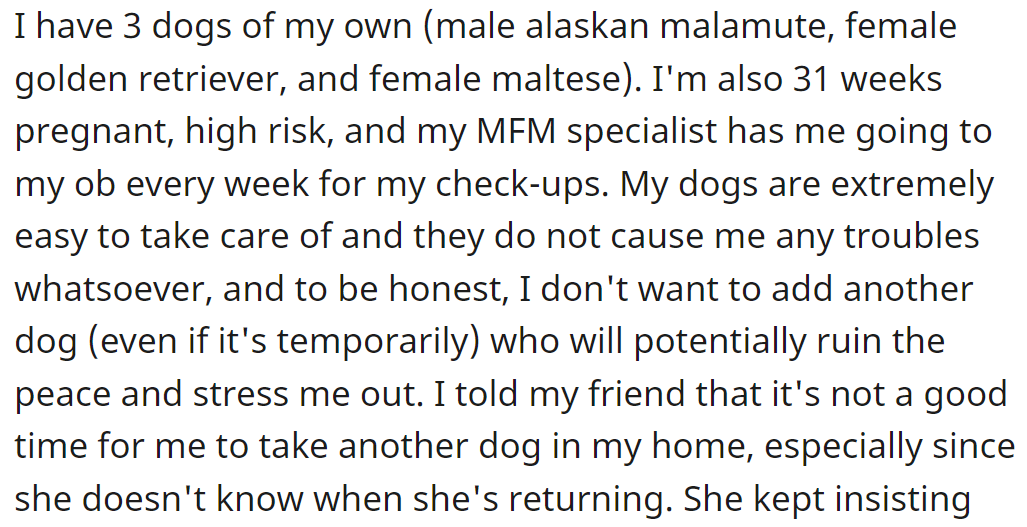
The decision not to dogsit during a high-risk pregnancy reflects an essential self-care strategy that many expectant mothers must learn. Research indicates that prioritizing one's health is crucial during pregnancy, especially in high-risk situations. According to the American College of Obstetricians and Gynecologists, managing stress and reducing exposure to potential stressors can significantly benefit maternal and fetal health.
This highlights the importance of setting boundaries and the potential guilt that can arise when those boundaries are challenged.
The friend urged, but the OP couldn't accept that responsibility:

They haven't spoken since, and the OP started to question her decision:

Understanding the Importance of Boundaries
Boundaries are essential in maintaining mental health, particularly during high-stress periods. Research in clinical psychology shows that individuals who effectively communicate their boundaries experience lower levels of anxiety and stress. This is crucial for pregnant women facing external demands and pressures, as they may feel compelled to please others at the expense of their well-being.
Establishing clear boundaries can protect against feelings of overwhelm and resentment, allowing for a healthier mental state during pregnancy.
The OP values their friendship but doesn't want to add unnecessary stress to her current situation:

Considering the OP's situation, her friend shouldn't have asked her in the first place
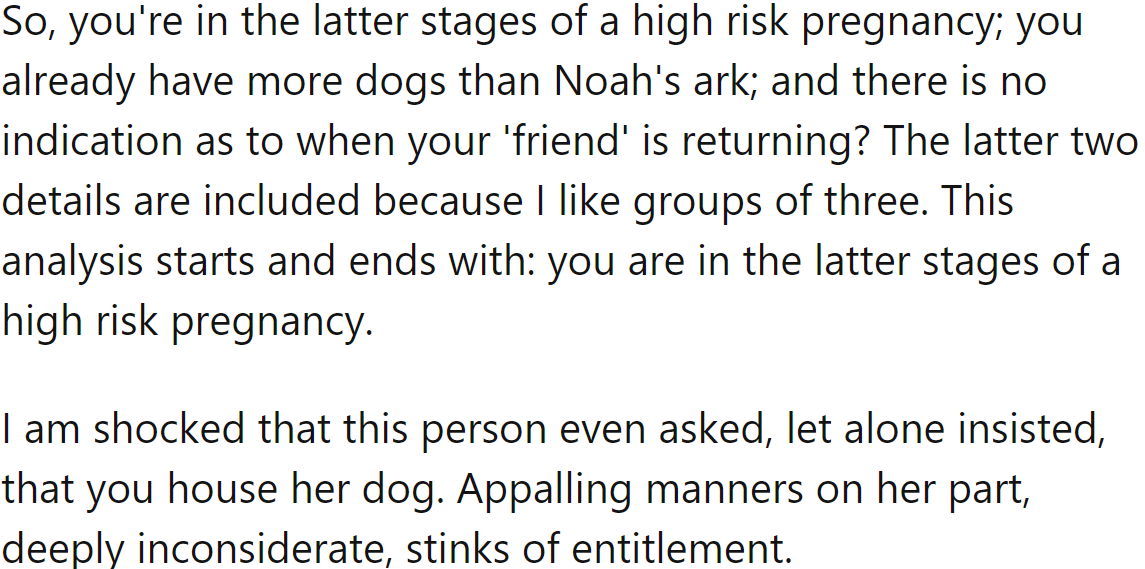
Practicing assertiveness and clearly expressing one's needs can alleviate the pressure to conform to others' expectations. Research suggests that assertive communication can enhance relationship dynamics, allowing for more supportive interactions. Developing these skills can empower women to advocate for their health and well-being effectively, ultimately benefiting both the mother and the baby.
Additionally, seeking support from healthcare providers or therapists can provide further validation and coping strategies to navigate these challenges.
The friend should have offered to help the OP, not add to her plate

The friend can find an alternative solution
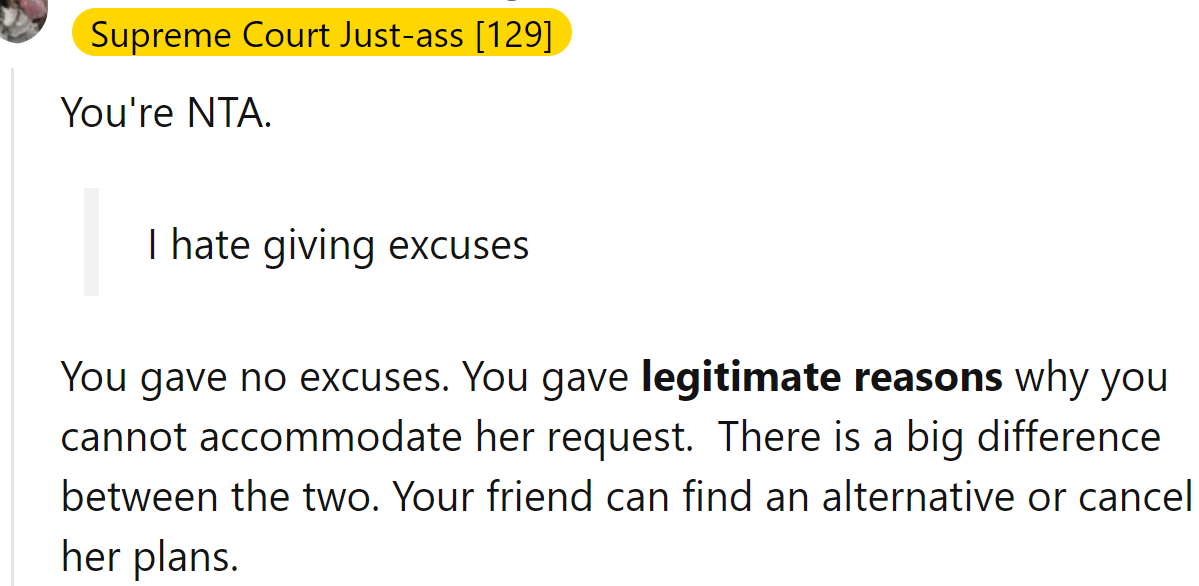
Considering the OP's current situation, she has legitimate reasons for refusing her friend's request to dogsit her puppy. Her friend shouldn't have asked her because the OP's plate is already full.
The friend has alternative solutions for her puppy and could ask someone else. The OP has the right to prioritize her health.
It seems like the friend tried to rehome her dog
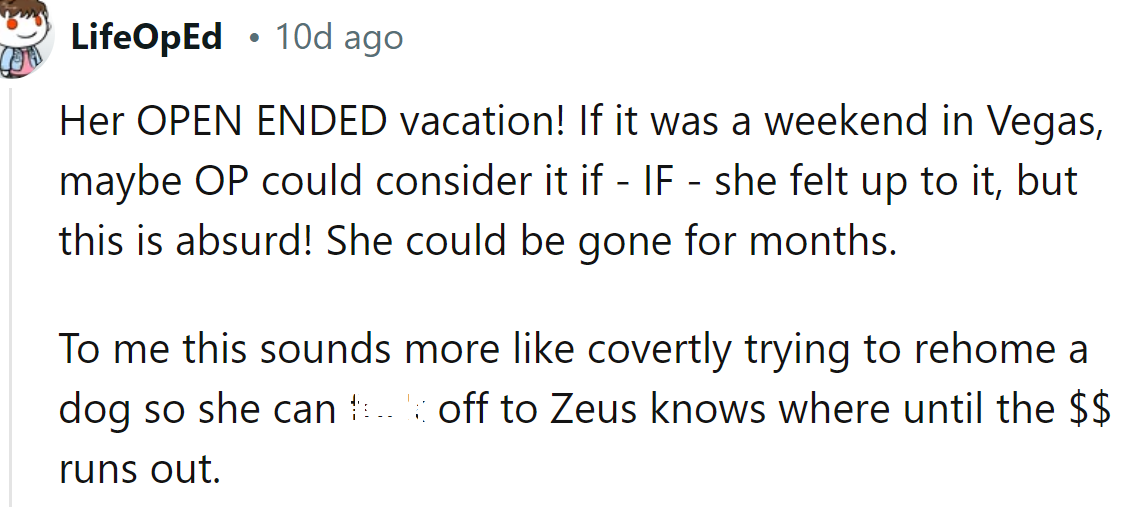
The OP didn't have to explain her decision, but since she did, her reasons are legitimate
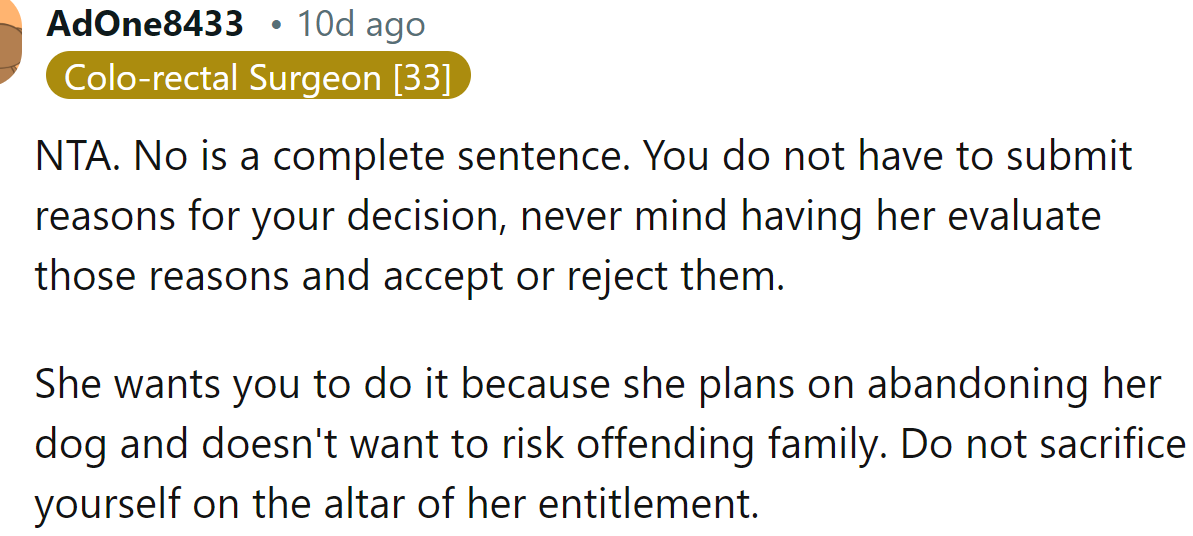
Coping with External Pressures
Dealing with external pressures during pregnancy, especially from friends or family, can be overwhelming. Studies show that social support plays a significant role in maternal mental health, but it can become a double-edged sword when expectations clash with personal needs. The American Psychological Association highlights the importance of evaluating the quality of support received, ensuring that it aligns with one's values and boundaries.
Learning to navigate these dynamics can foster healthier relationships and a more positive pregnancy experience.
Another Redditor also suspected that the friend wanted to abandon the dog

Psychological Analysis
This situation underscores the importance of self-advocacy during high-risk pregnancies. Women often feel pressured to accommodate others, which can threaten their well-being. Recognizing the need for boundaries is a vital step in ensuring both maternal and fetal health.
Analysis generated by AI
Analysis & Alternative Approaches
In summary, high-risk pregnancies invoke unique psychological challenges that require careful navigation. By prioritizing self-care and establishing boundaries, expectant mothers can protect their mental and emotional health. Research supports the notion that developing assertive communication skills and seeking appropriate support can enhance the overall pregnancy experience.



